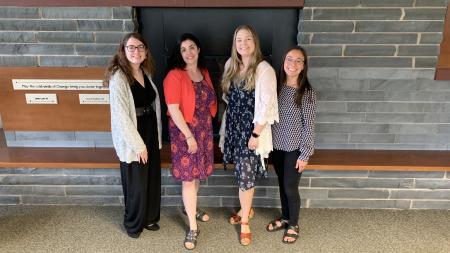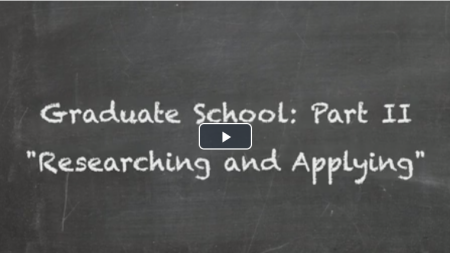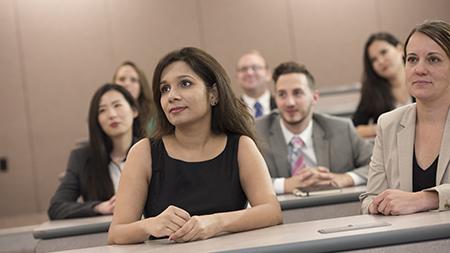Planning ahead is key in the graduate/professional school application process. Use the general timeline below to help guide you through the application process:
Timeline
- Begin researching available programs
- Review grad school guides/directories Request promotional materials
- Visit schools' websites
- Talk to faculty/alumni/current students in the program
- Start exploring financial aid resources
- Sign up for the required standardized test and take a practice test
- Identify potential letter of recommendation writers
- Set up an appointment with Career Services to discuss a plan.
- Develop your personal timeline for applying.
- Order an unofficial transcript and correct any discrepancies
- Take the required standardized test
- Write the first draft of your personal statement/statement of purpose
- Request your letters of recommendation from faculty
- Order official transcripts
- Write final draft of your personal statement/statement of purpose.
- Investigate funding sources.
- Complete and submit your applications
- Apply for the financial aid available through the graduate program: assistantships, fellowships, scholarships, etc.
- Complete and submit federal and state financial aid applications
- Visit prospective campuses if possible and talk to faculty and students to help you make your final decision
- Follow-up with schools to make sure your file is complete
- After receiving acceptance from the school of your choice, send in the required deposit and contact other schools to decline acceptances
- Write thank you notes to people who helped you
Admissions Exams
You took the SAT or ACT for entrance into college. If you want to go to graduate school, you may need to take another entrance exam. Graduate school entrance tests are field-specific:
- LSAT - Law School
- MCAT - Medical School
- GMAT - Business School
- GRE® - Graduate School
- MAT - Graduate School
- DAT - Dental School
- PCAT - Pharmacy School
- OAT - Optometry School
The Graduate Record Exam (GRE) is the most common entrance exam for most other fields. The GRE General Test is, essentially, the SAT for grad school - it measures your overall scholastic ability, specifically verbal and quantitative reasoning, critical thinking and analytical writing skills. Read about the GRE revised General Test. Tutorthepeople.com test preparation. Their top-scoring, highly-experienced GRE tutors will help you improve not only your test scores, but your understanding of the material. They have a history of helping students raise their scores on the GRE, as well as most other major standardized tests. Their GRE tutors tailor each GRE prep course to match the student’s learning personality. Chegg.com has free resources for the test preparation. They also suggest some strategies for the GRE Test Day.
The Law School Admission Test (LSAT) is a half-day, standardized test administered four times each year at designated testing centers throughout the world. The test is an integral part of the law school admission process in the United States, Canada, and a growing number of other countries. It provides a standard measure of acquired reading and verbal reasoning skills that law schools can use as one of several factors in assessing applicants.
In the United States, Canada, the Caribbean, and some other countries, the LSAT is administered on a Saturday, except in June, when it is generally administered on a Monday. For Saturday Sabbath observers, the test is also administered on a weekday following Saturday administrations.
Many law schools require that the LSAT be taken by December for admission the following fall. However, taking the test earlier-in June or September-is often advised. Tutorthepeople.com LSAT test preparation. Do not let the LSAT be a hurdle to your legal career. Tutor the People’s individualized approach to tutoring can help you achieve the score you deserve. Every student has the ability to succeed, they just need to recognize and strengthen their own capabilities. That’s where they come in. At Tutor the People, their tutors instill the core principles in reasoning, logic and critical analysis which form the blueprint to each student’s unique angle to test taking. Chegg.com has a free practice test. They also have an article entitled: 5 Tips to LSAT Success.
The Medical College Admission Test® (MCAT®) is a standardized, multiple-choice examination designed to assess the examinee's problem solving, critical thinking, writing skills, and knowledge of science concepts and principles prerequisite to the study of medicine. Another helpful resource can be found through Gold Standard Multimedia Education. They have a number of options for MCAT test preparation, including free resources such as a free practice test, free summaries for the sciences (Biochemistry, Physics, Chemistry, etc.), as well as paid programs with as many as 16 full-length MCAT practice tests which include official AAMC exams on our website www.MCAT-Prep.com
Tutorthepeople.com has test preparation materials. Their tutoring philosophy is to focus on the individual student. A top-scoring, experienced private tutor will help you master the material included on the MCAT, either in-person or online. From improving your scores on the CARS section to helping you dissect complex MCAT biochemistry problems, their MCAT tutors have a proven track record of helping students receive acceptances to top medical schools.
Tutor the People’s expert team of medical students and doctors will help you every step of the way to ensure your best chance of acceptance through private tutoring that is tailored to your needs.
Chegg.com has some free test preparation resources for the MCAT. They also offer an article entitled: The Best Way to Study for the MCAT.
The GMAT is the Graduate Management Admission Test, a standardized test required by the vast majority of business schools because it provides a measure of an applicant's academic ability. The GMAT test does not include any questions that gauge your business knowledge. The GMAT test is computerized and administered six days each week, 52 weeks per year. While the exam can be taken at virtually any time, it can only be taken once per 31 days and 5 times per year.
Tutorthepeople.com has test preparation materials. Tutor the People will match you with an expert private GMAT tutor who can help you raise your scores and master the material.
- Educational Testing Services, writer of the GRE, offers free test prep materials including online tips and downloadable POWERPREP software that includes: practice tests, practice questions with explanations and charts and reports that show how your score compares to those of other GRE test takers. See: Prepare for the GRE revised General Test.
- The Kaplan Online Prep for the GRE has on demand prep courses. See GRE Psychology at a Glance.
- Chegg.com has some free resources to help you prepare. They also have an article with some Last Minute GMAT Tips.
- The Princeton Review GRE Online Courses let you prepare on your own schedule, at your own pace.
Letters of Recommendation
Recommendation letters are a critical part of your graduate school application. An effective letter should provide those making admissions decisions with an assessment of your potential as a graduate student and/or researcher. How you request a letter of recommendation influences the quality and type of response you receive from your recommender.
Below are some tips for making your request:
Recommendation letters should be written by someone who knows you well academically and can provide an evaluation of your ability to perform and succeed at the graduate level. Faculty members most commonly write letters of recommendation. Consider any professor:
- who has seen your best academic work
- with whom you've participated in a research project
- with whom you engaged in a semester-long project
- with whom you visited during their office hours
- with whom you still communicate
- Make a list of professors and/or supervisors who will be your best advocates
- Set up an appointment to discuss your request in person (do not make the request via email if possible)
- During the meeting discuss your academic interests further and your desire to apply to graduate school
- Ask them if they are willing to write you a strong letter. If you sense reluctance or the answer is no, ask someone else. Here are some ways to ask:
- Do you feel you know my work well enough to write me a good recommendation letter?
- I know you are very busy, but do you think you could find the time to write me a strong recommendation letter?
Once someone agrees to write you a recommendation letter then be sure to provide the following information with them:
- Resume, cover letter or personal statement used to apply
- Copy of your transcript
- A list of the schools and programs to which you are applying
- Due dates for the letters with the earliest due date at the top
- Links to or information on where they can submit the letters
- Related academic and research activities (poster presentations, research papers, class projects, internship programs, etc.)
- Honors and awards received
- Information on how to get in touch with you in case they need to reach you
- What you would like emphasized in the letter(s).
- Check your specific graduate program's letter of recommendation guidelines. If there is specific information being requested, advise your letter writer to include this information.
- Give your recommenders at least several weeks’ notice. You do not want your recommenders to be rushed; instead, you want to give them enough time to write a comprehensive and accurate letter.
- Check with your recommenders to make sure they submit the letter, but do not pester them.
What if I plan to take some time off before I go to graduate school?
If you plan to take some time off before going to graduate school, don’t wait until you want to apply to graduate school to ask for letters. Your professors could be on sabbatical or you may not be fresh in their minds anymore. You can ask professors for a "general" letter of recommendation before you leave SUNY Oswego. When you are ready to apply to graduate school, contact professors again, and ask them to update your letters.
Send a note of gratitude as soon as recommenders write you a letter. Keep in touch – let you recommender know the status of your application. Be sure to let your recommenders know the final outcome of your graduate school search.
The personal statement is one of the most important pieces of your graduate school application because it:
- Gives the reviewers an understanding of your academic background and interests
- Allows you to illustrate in your own words what sets you apart from other applicants
- Helps them determine if you are a good match for the program to which you are applying
- Shows your communication style and ability
Usually the purpose is to persuade the admissions committee that you are an applicant who should be chosen.
- Pay attention and follow instructions very carefully – every program is different and some have specific items/topics they want you to address.
- Be sure to answer any questions fully.
- Indicate what you would like to study in graduate school in enough detail to convince the faculty that you understand the scope of research in the discipline, and are aware of research trends.
- Know your audience - thoroughly research the program, its faculty and research focus areas
- Describe why you are a good fit for the program, and why the program is a good fit for you
- Describe your academic background, achievements, preparation and training in enough detail to show your experience and preparedness in the field:
- Skills you have learned from academic, lab or research experiences (e.g., undergraduate coursework, research opportunities, scholarly writings, jobs in the field, presentations, etc.).
- Co-curricular opportunities you have had that show leadership, ability to work with a diverse group of people, teaching skills, etc.
- Demonstrate that you are self-motivated, persistent, competent, and have the skills necessary to be successful in graduate school
- Proofread and pay close attention to details – they really matter!
If you need some help figuring out what to write, make an appointment with a Career Coach to come up with a plan.
- Once you have done a draft, show it to people you trust such as faculty, advisor, letter of recommendation writers, etc.
- The best people to review your statement are those who know you well and have excellent writing skills.
- Statementofpurpose.com is an excellent resource that includes essay critiques and writing tips.
- Check out Purdue's OWL (Online Writing Lab) - "Writing the Personal Statement" resource
Resources to Help

Meet with a Career Coach
Schedule an appointment with a Career Coach to walk you through Graduate School prep.

Video: Applying to Graduate School
Once you've made the decision to further your education with graduate school, you can now focus on the application process. From test prep to letters of recommendation, Billy walks through everything you'll need to be ready!

Apply for SUNY Oswego graduate programs
Whether you’re looking to increase your earning potential, ascend to a leadership position, or launch a new career path, one of Oswego’s graduate programs will be a pivotal next step in accomplishing your goals


